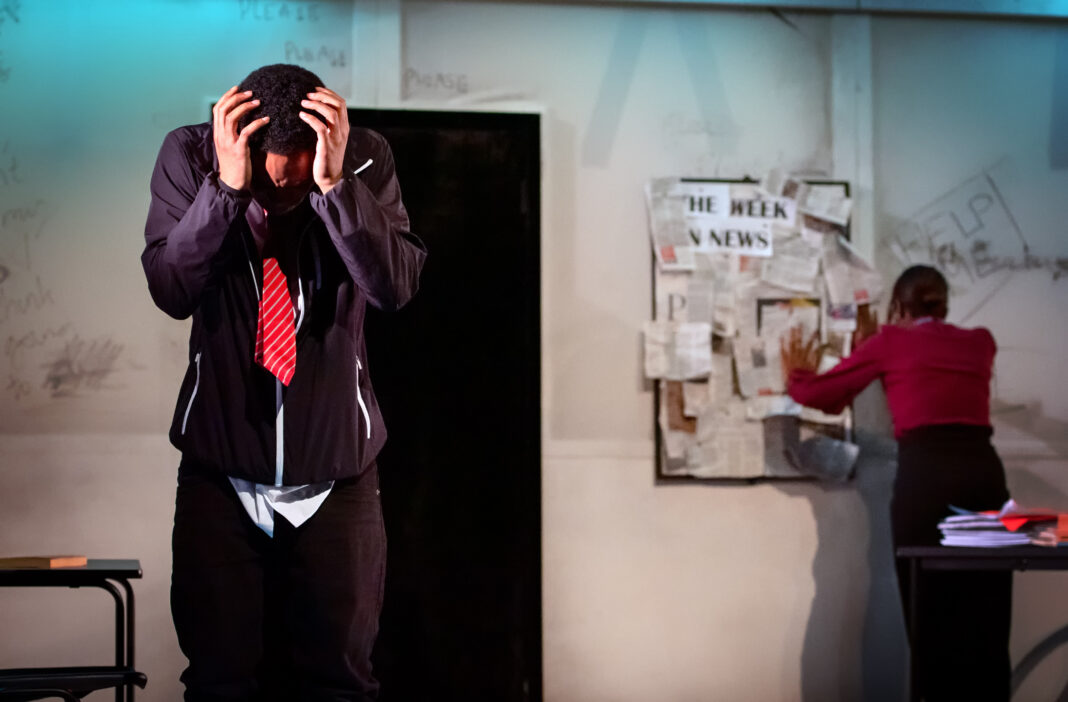Playwright: Nana-Kofi Kufuor
Director: Dermot Daly
Production: Red Ladder Theatre Company, with support from Leeds Playhouse and Oldham Coliseum Theatre.
Black teenager Reece is stopped by the police in an aggressive exchange, whilst his Black teacher, Gillian, watches and does nothing to intervene. The next day, Gillian is forced to face an angry Reece when he locks her in the classroom and refuses to let her out. What follows is a gruelling hour of intense confrontation, leading to life-changing realisations for both of them.
Whilst I watched the scenes being performed on stage, there was also a scene being played out amongst the audience. Sat in front of me was a Black man, who kept nudging his teenage son and chuckling with approval. Then I looked to my right and saw rows of still white faces, completely consumed; some were even slightly frowning. For me, this off-stage scene perfectly embodied the essence of this play.
“We have these conversations among ourselves, whether we’re Asian or Black, but theatre spaces are predominantly white. I want them to feel uncomfortable and squirm at what the characters say, because a lot of the time it’s hard to empathise with those people when you’ve not been in those situations. So, I wanted to start a debate and make them feel uncomfortable because all my life I’ve been uncomfortable, and if you have to feel uncomfortable for an hour and ten minutes to understand someone else’s experience, then so be it,” writer Nana-Kofi Kufuor explains.
With a BA Hons in Film and TV Production and a Master’s in Screenwriting under his belt, it’s no surprise that 30-year-old Kofi was one of the six people to win the BBC 1Xtra monologue prize in 2017. And this is where his almost accidental journey with theatre began, when The Exchange Theatre came across it and encouraged him to give playwriting a go.
“I knew nothing about theatre, I’d only been to pantomimes and one play! They contacted me several times and I refused several times. I then had a frank conversation with them, expressing how I had never felt comfortable in theatre spaces, how the stories never seemed to reflect me or my life. But I have a voice and it needs to be heard.”
Kofi amplifies this voice and really owns the theatre space by featuring only black voices in this show. It’s an intimate setting with just two characters and no melodrama. Yet he manages to capture all the crucial elements of Black people’s experiences and keep the audience captivated throughout, cleverly weaving the excellent dialogue and bold characters with scenes of them role-playing with each other – all without the presence of a non-Black voice. From the history of slavery to the Kardashians blackfishing, Kofi leaves no stone unturned.
BLM
And all of these stones were turned during the international George Floyd protests in 2020, where the Black Lives Matter movement gained further worldwide attention and support. So, it’s very impressive that the play was actually written before the BLM protests, during which these conversations had just begun on a globally collective scale, and was delayed due to the pandemic. But it also emphasises the urgency and ongoing relevance of these discussions.
“These conversations have always been had; they’ve just never been had in a theatre space. Even though this was written way before the BLM protests, I didn’t change anything after. And for me nothing has changed. The BLM protests were just a moment where a certain group of people got to see into what it was like to be Black.”
And that’s exactly what My Voice Was Heard does, too. However, what makes the show stand out is it being written through the lens of the British Black community in particular. For example, the opening scene is of teenager Reece being stopped and searched by the police for no good reason, an apt reflection of racial profiling in the UK where Black people are nine times more likely to face stop and search than white people. This combined with Reece’s strong Mancunian accent, which sparked a sentiment of familiarity in me and felt like home, made not just this scene but the whole play more hard-hitting. I doubt that that this juxtaposition was deliberate, but it moved me nonetheless.
Characters
And with such exceptional characters, played excellently by Misha Barry (Gillian) and Jelani D’Aguilar (Reece), how could it have not? Cocky, intense and absolutely hilarious for the best part, Reece’s raw intelligence teamed with his fierce yet pure passion for justice can only make you feel one of two ways – like giving him a standing ovation for scratching that itch of your internal pain point, or grimacing in your seat because he went too far.
“Reece is who I wish I was in high school. I wish I had his confidence! It’s taken me years to learn how to articulate myself. I had to be careful because I was getting really worked up about stuff, and I felt that as a Black man I don’t have the privilege to just shout. I have to articulate my feelings and this play is just an example of me articulating instead of shouting.
“But when I wrote Reece I thought “forget it” – I don’t want him to be careful and considerate with his words, he has to be brash and arrogant.”
Reece’s grievance with his seemingly arrogant teacher is that she is “not Black enough”, and he continuously accuses her of this throughout the story. Consequently, the element of racial identity is thoroughly explored through Gillian, who is in a constant internal and external battle for not fitting the moulds that Reece and the rest of the world expect her to.
“Gillian starts out as someone who reminds me of a certain Black Conservative MP and I honestly can’t stand them. Whenever something goes wrong with the Conservative party, they wheel this MP out even if the issue has nothing to do with them! But overall, the characters almost represented my own two extremes – Gillian, my insecurities and Reece, my over-confident ego.”
This play did it in a profound way that encompassed many elements, but I believe that the “woke” versus “coconut” narrative has generally been exhausted – the character that’s unapologetically Black/Asian versus the one who is ashamed. As a British Asian myself, I’ve found that these behaviours within ethnic minority communities are sometimes a reaction to racist experiences, aside from a person’s upbringing and background, and that these triggers are not explored enough. Kofi agreed and explained how he challenged this dynamic through the characters.
“Not every Black or Asian person has the same experience as every other Black or Asian person. So, for our community to prosper we need to stop the idea of “you’re not Black to ME, so you’re not Black” and stop ostracising. I recently worked in mainstream education, and that’s how they treated me even though I wasn’t like that. They just assumed that because I didn’t have an accent like theirs and grew up in Stockport, I must be a Tory or mustn’t like Black people and hate the N-word, when actually I was the most left-wing person you could ever meet.”
Educate yourselves
Above all, My Voice Was Heard is a shining example of educating people through creativity, to tell the stories that may otherwise go unheard – stories that hold the potential to change societal views and are too powerful to go unheard.
“I’m at that point now that when white people ask me to educate them on race and my experience, I have the confidence in saying “you can buy a book” or “you can watch my play”. There are so many outlets now that I don’t have to relive my trauma for you. There are a million examples and this is just my opinion on a situation, but this is one way that you can enter the conversation.
“I think all art should make you feel something, regardless of the education factor – hate it or love it but if you come out of the theatre feeling indifferent and that the play was a definitive answer, then that would be an issue for me.”
Kofi is currently a story researcher and writer for the popular TV series Waterloo Road. With what he has done through My Voice Was Heard – and so early on in his career, too – there is no doubt that this talented Mancunian is one to watch out for.












